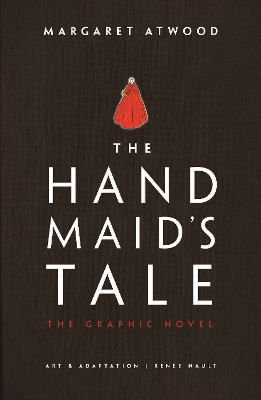
Provocative, startling, prophetic, and more relevant than ever, The Handmaid's Tale has become a global phenomenon. Now, in this stunning graphic novel edition of Margaret Atwood's modern classic, the terrifying reality of Gilead is brought to vivid life like never before.
"Everything Handmaids wear is red: the colour of blood, which defines us." Offred is a Handmaid in the Republic of Gilead, where women are prohibited from holding jobs, reading, and forming friendships. She serves in the household of the Commander and his wife, and under the new social order she has only one purpose: once a month, she must lie on her back and pray that the Commander makes her pregnant, ecause in an age of declining births, Offred and the other Handmaids are valued only if they are fertile. But Offred remembers the years before Gilead, when she was an independent woman who had a job, a family, and a name of her own. Now, her memories and her will to survive are acts of rebellion.
The Handmaid's Tale and its iconic images - the red of the Handmaids, the blue of the Wives, the looming Gileadean Eye - have been adapted into a film, an opera, a ballet, and multi-award-winning TV series. This groundbreaking new graphic novel edition, adapted and featuring arresting artwork by Renée Nault, is destined to become a classic in its own right.
- ISBN10 1473571626
- ISBN13 9781473571624
- Publish Date 26 March 2019 (first published 1 January 1985)
- Publish Status Active
- Publish Country GB
- Publisher Vintage Publishing
- Imprint Vintage Digital
- Format eBook (EPUB)
- Pages 240
- Language English
Reviews


kiracanread

Ashley
- There's no more information in the book than the TV show. In fact, there's probably less. So if you're looking for more detail, you won't get any.
- It's written as a stream of consciousness. So we might get an entire page talking about what the garden looks like. Yawn.
- There's so little world building and practically zero backstory for anyone. Even the TV show had me itching for more detail and more history. The book had even less.
- There was nothing satisfying about the ending for two reasons:
1) It was fairly open ended.
2) Because the whole book barely skimmed the surface of anything, I never really came to care about the main character. I wasn't particularly bothered by anything that happened to her.
The TV show got me way more invested. There was more detail into the atrocities, which made me get outraged and thus care. There was more information about how the world got into that state (still not a ton, but more, at least). There was more exploration into Serena Joy's character, which made you see how insanely desperate she was to have a child, which added to the overall story.
If I hadn't watched the TV show prior to reading this book, I doubt I would have finished it. I would have been confused about what was happening, bored out of my mind, and felt like I had no reason to continue.

Kim Deister
The novel takes place in a dystopian near future (roughly 2004-2005). after society has fallen to a religious new order. The USA is no longer, now known as the Republic of Gilead. Society is based on a literal interpretation of the Book of Genesis, a rather chilling androcentric, misogynistic social order. Birth rates have sharply reason, providing the justification for the new system. Women have had virtually all of their rights taken away, reduced to categories like Jezebels (pleasure women), Marthas (cooks/housekeepers) and Handmaids (fertile breeding women). Aunts are in charge of retraining the lesser women, indoctrinating them in the new world order. Only the Commanders' Wives have even a touch of freedom, but that, too, is limited. The Handmaids even lose their names, becoming "Of-" and whatever the Commander's first name is.
It is a disturbing look at sexual politics, particularly the ways in which sexuality is or isn't expressed based on gender. It is a book about power and how what is seemingly utopian for some, it is clearly dystopian for others.
This is a book that is extremely thought-provoking, especially in this day and age. Despite the fact that it was published 31 years ago, there are so many themes in it that are just as relevant in today's world. There were times when I forgot I was reading a book that supposedly took place more than a decade ago.
The Handmaid's Tale is a part of me now, one of those books that I will read again and again. It is the kind of book that will give you a new experience each time it is read.

wcs53
This is, at times, a harrowing story. There were moments of hope, but these were drowned out by the overall despair of the situation of Offred, the narrator of the story, who is the Handmaid referred to in the title. What was most interesting for me is the this book was written over 30 years ago, yet it spoke to many of the things happening in our world today. What I liked most about this book was that the reality of the world in which it was set was slowly revealed and that it wasn't all obvious from the start. I also enjoyed the way that the past, including how things got to how they were, was also revealed slowly, bit by bit. This made it a very interesting and compelling read.
I'm not going to get into the plot much, as I wouldn't want to give much away. It's worth the read and is a book that hasn't aged over the years since it was first published.

Terri M. LeBlanc
For me, it just wasn't my cup of tea. I wanted to know more about everything happened especially after listening to the historical note at the end. If that hadn't been included, I feel I might have enjoyed the book more. I felt the addition of the conference notes were jarring and a bit "I know something you don't know" and that pissed me off.

Melanie

bettyehollands

verkaskodova
Styl Atwood je na jednu stranu skoro až děsivě jednoduchý, na stranu druhou vám předloží nádherné množství metafor, že se v tom jazyku vyžíváte. A pak ta zdánlivá emocionální chladnost daná retrospektivním vyprávěním... Čte se to prostě rychle, jediná brzda je to, že pokud jste slabší povahy jako já, budete si muset dávat nucené pauzy.
Postavy naprosto lidské, chybující a šedé, jak já říkám (ani zatracující černá, ani svítivě bílá).
Seriál nevím, jestli zvládnu, každopádně před spisovatelkou smekám. Obzvlášť, když vím, že příběh vykonstruovala v roce 1984.
Knihu jsem četla v edici nazvané "Vintage Classics". Zařazení totálně chápu.

Amber (The Literary Phoenix)
"We slept in what had once been the gymnasium."
Offred lives in a world where her name no longer matters. She is no longer considered a person - she has no right to hold property, choose her own clothing, read, use body lotion, or love. Offred is an object, but she remembers the time before. She remembers her friends, her mother, her husband, her daughter. She is not supposed to remember. Offred, like all other women, is to forget her humanity and embrace her new role in life - to breed.
What a demeaning and horrifying life.
Let's talk about Offred.
The story is told in first person. Most of this is Offred's thoughts, observations, and memories. The story is written in such a way that we learn about three different time periods of Offred's life: Her life before, her time at the Red Centre, and the present. I really liked this format - it shows us her whole story. It also shows us the silence. Every flashback is time that Offred is alone and rather than rush through these moments to the "exciting" ones, Atwood uses this time to reflect on the quiet in their lives and show us how it came to be.
It took me a couple chapters to figure out, but there's a method to Atwood's madness in her use of quotation marks. This drives a lot of people crazy, but once I realized what was going on, I loved it. Noticing where there are and aren't quotation marks gives you a better level of understand of how ostracized Offred is. Few few people talk to her, especially at the beginning of the book. Some because of rules, others because they hate her. By no fault of her own. It's really interesting.
Overall, I think the writing is brilliant.
Atwood's style is subtle and the ideology is not forced upon the reader. You're simply seeing a little bit of time into one woman's life at a leisurely pace. Dystopias have largely focused on being bigger, darkest, with greater shock value... but sometimes something as subtle as this can have a greater impact. I found The Handmaid's Tale shocking in both its feminist narration as well as the idea of controlling a society through sex and and sin... or the lack thereof. Through removing free will of who to love - because remember, even the Wives are "chosen". It well written, a manageable pace in a manageable number of pages. We see Offred grow as she rebels in her remembering, in the way she talks, and in the offers she accepts. The world is well defined but not forced upon the reader with long, tedious descriptions. I found the "holy rollers" and the wall both equally telling and foreboding about the society.
All in all, just brilliant, really. Worth a read, but read it slowly and carefully or you will miss the subtle nuances.
Nolite te bastardes carborundorum, my friends.
"And so I step up, into the darkness within; or else the light."
CHECK OUT MY BLOG FOR MORE REVIEWs.
